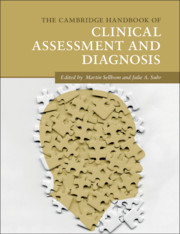Book contents
- The Cambridge Handbook of Clinical Assessment and Diagnosis
- The Cambridge Handbook of Clinical Assessment and Diagnosis
- Copyright page
- Contents
- Figures
- Tables
- Contributors
- Acknowledgments
- 1 Introduction to the Handbook of Clinical Assessment and Diagnosis
- Part I General Issues in Clinical Assessment and Diagnosis
- 2 Psychometrics and Psychological Assessment
- 3 Multicultural Issues in Clinical Psychological Assessment
- 4 Ethical and Professional Issues in Assessment
- 5 Contemporary Psychopathology Diagnosis
- 6 Assessment of Noncredible Reporting and Responding
- 7 Technological Advances in Clinical Assessment
- 8 Psychological Assessment as Treatment
- 9 Writing a Psychological Report Using Evidence-Based Psychological Assessment Methods
- Part II Specific Clinical Assessment Methods
- Part III Assessment and Diagnosis of Specific Mental Disorders
- Part IV Clinical Assessment in Specific Settings
- Index
- References
4 - Ethical and Professional Issues in Assessment
from Part I - General Issues in Clinical Assessment and Diagnosis
Published online by Cambridge University Press: 06 December 2019
- The Cambridge Handbook of Clinical Assessment and Diagnosis
- The Cambridge Handbook of Clinical Assessment and Diagnosis
- Copyright page
- Contents
- Figures
- Tables
- Contributors
- Acknowledgments
- 1 Introduction to the Handbook of Clinical Assessment and Diagnosis
- Part I General Issues in Clinical Assessment and Diagnosis
- 2 Psychometrics and Psychological Assessment
- 3 Multicultural Issues in Clinical Psychological Assessment
- 4 Ethical and Professional Issues in Assessment
- 5 Contemporary Psychopathology Diagnosis
- 6 Assessment of Noncredible Reporting and Responding
- 7 Technological Advances in Clinical Assessment
- 8 Psychological Assessment as Treatment
- 9 Writing a Psychological Report Using Evidence-Based Psychological Assessment Methods
- Part II Specific Clinical Assessment Methods
- Part III Assessment and Diagnosis of Specific Mental Disorders
- Part IV Clinical Assessment in Specific Settings
- Index
- References
Summary
This chapter addresses the essential ethical and professional considerations when conducting psychological assessments. Testing impacts the life of examinees in a variety of ways from licensing examinations and screening for certain professions to custody evaluations and competency to be executed. Ethical practice in the area of assessment reflects good clinical practice. Topics include informed consent, confidentiality, the involvement of third parties in assessment, external consequences, test construction, test revisions, obsolete tests and outdated test results, cultural competence, test data and test security, assessment in the digital age, as well as the less frequently addressed topic of report writing and providing assessment feedback. A good ethical decision-making framework as well as the APA Ethical Principles of Psychologists and Code of Conduct (APA 2017a) and the Standards for Educational and Psychological Testing (AERA et. al. 2014) provide guidance on preventing ethical issues from becoming ethical challenges both currently and as new ethical issues in assessment continue to emerge.
Keywords
- Type
- Chapter
- Information
- Publisher: Cambridge University PressPrint publication year: 2019
References
- 3
- Cited by

